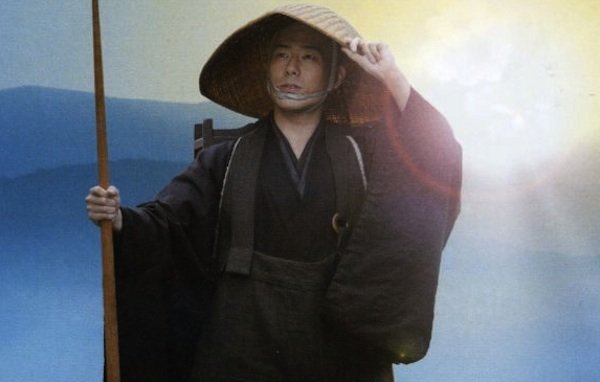Chiyono was a servant in a Zen convent who wanted to practice zazen. One day she approached an elderly nun and said, “I’m of humble birth. I can’t read or write and must work all the time. Is there any possibility that I could attain the way of Buddha even though I have no skills?”
The nun answered her, “This is wonderful, my dear! In Buddhism there are no distinctions between people. There is only this: each person must hold fast to the desire to awaken and cultivate a heart of great compassion. People are complete as they are. If you don’t fall into delusive thoughts, there is no Buddha and no sentient being; there is only one complete nature. If you want to know your true nature, you need to turn toward the source of your delusive thoughts. This is called zazen.”
Chiyono said, with happiness, “With this practice as my companion, I have only to go about my daily life, practicing day and night.”
After months of wholehearted practice, she went out on a full-moon night to draw some water from the well. The bottom of her old bucket, held together by bamboo strips, suddenly gave way, and the reflection of the moon vanished with the water. When she saw this she attained great realization.
Her enlightenment poem was this:
“With this and that I tried to keep the bucket together, and then the bottom fell out. Where water does not collect, the moon does not dwell.”
– From The Hidden Lamp
Many of you know that, a year or more ago, our teacher Peter Wohl decided to add The Hidden Lamp, a collection of stories about women practitioners, to the koan curriculum here at Treetop. And I’m so glad he did. Though I was never aware of anything missing in the traditional koan collections—which, with only a couple of notable exceptions, feature all men all the time—getting to spend some quality time with my female ancestors has been a gift. Their perspectives bring a richness to our tradition that I find indispensable.
Hearing me say that may surprise you. After all, from the perspective of the Absolute, of Emptiness, categories such as male and female, black or white, rich or poor, all drop away into meaninglessness. How could gender matter in the dharma? But here in world of Form, where we’ve all got to deal with one another, make a living, or even just try to walk down the street in peace, such distinctions can make a big difference. It’s important that we never forget that.
Take Chiyono, the woman from this case. Not only was she a woman—an unfortunate accident of birth for much of human history and across most cultures, continuing, for many, even to this day and in this culture—but she was poor and illiterate, too.
While having to work for a living may not sound like a big deal, we have to remember this story takes place in the 13th Century. Chiyono wouldn’t have been a working class stiff with a 40-hour workweek and the muscle of a union behind her. When she told the nun she had to work all the time, it’s likely she literally meant all the time. Come to think of it, that may not be so different from many people’s realities today …
But so what? It’s a well-known tenet of Zen that one needs no formal learning to attain realization. As Bodhidharma, the first patriarch of Zen in China, is purported to have said, Zen is “a special teaching outside the scriptures, beyond words and letters, pointing to the mind-essence of man (or woman), seeing directly into one’s True Nature.”
That dictum was borne out just a few generations later when Hui-Neng, the sixth patriarch and an instrumental figure in its spread, received transmission from his teacher Hung-Jen despite the fact that he was an illiterate peasant who had only just entered the monastery. He was, as his teacher pointed out when he asked to ordain, just a barbarian from the south. And yet, the brilliance of his insight was so great we’re still talking about him today.
We love to trot out these romantic origin stories, but the reality over the millennia since the Buddha first looked up from beneath the Bodhi tree and saw the morning star has been much less egalitarian. Just like today, when most American Buddhists seem to be pursuing the Upper Middle Way, opportunities to sit down, shut up and look deeply into one’s True Nature have always been hard to come by for those of lowborn status.
And for women? Fuhgettaboutit! Zen, and most other forms of Buddhism—actually, most religions, period—have mostly been boys clubs. Some sects of Buddhism even taught that women couldn’t be enlightened, but should practice diligently in order to be reborn as men in their next lives. Too often, women were viewed as a distraction, at best, to those interested in attaining the way.
This is heartbreakingly illustrated in another koan from The Hidden Lamp, about Ryonen, a strikingly beautiful woman who had a flash of insight and wanted to become a nun. Teacher after teacher turned her away, telling her that, while they appreciated her sincerity, her beauty would be a hindrance for the monks practicing with her. Determined to devote her life to practice, Ryonen burnt her face with a laundry press, disfiguring herself so that she could be accepted into the sangha.
It’s a tale as old as time. Women with the drive to accomplish anything important have always had to make unthinkable sacrifices. Even today. Consider the uproar a few years ago around Sheryl Sandberg’s book Lean In. Many critics were rightly up in arms at the idea that, to be successful, a woman must simply work harder—at the expense of any sort of personal life and without any meaningful critique of the dominant culture—than her male colleagues.
How fortunate for Chiyono, then, that of all the places she could have been a servant, she landed in this particular convent with this particular nun, who didn’t tell her it was hopeless to see into her True Nature as a woman or a layperson. She didn’t tell her she needed to shave her head, ordain, and devote herself single-mindedly to sitting zazen for hours and hours each day if she were to have any prayer of waking up. This nun understood there is nowhere we can go, and nothing we can do, that is apart from our Buddha Nature.
Eihei Dogen, the Japanese founder of our Soto tradition, expressed this beautifully in Genjokoan, his spiritual masterwork. He wrote:
Enlightenment is like the moon reflected on the water. The moon does not get wet, nor is the water broken. Although its light is wide and great, the moon is reflected even in a puddle an inch wide. The whole moon and the entire sky are reflected in dewdrops on the grass, or even in one drop of water. Enlightenment does not divide you, just as the moon does not break the water. You cannot hinder enlightenment, just as a drop of water does not hinder the moon in the sky.
Whether we understand that we are as boundless as the ocean or we believe we are just a tiny dewdrop on a blade of grass, our capacity for awakening is just the same. It’s right within our grasp. Not over there somewhere, but right here, in this breath. And this one … And this one …
We think we have to change ourselves to “get it,” but there is nothing we need to “get.” Just as we are—flawed, angry, confused, filled with self-destructive desires, and scared shitless—is already Buddha.
Zen is not a self-improvement program. Zen is not a self-anything program. Zen is learning to see clearly that whoever, whatever, we think we are, whatever we think limits us, is an illusion. Zen is working with each breath to let that all go and then finding out what’s left.
Most of us think that to do that we must suppress or push away the parts of ourselves that trouble us—what we think, what we fear, what we crave. But that never works. The Buddha learned that 2,500 years ago, after years of trying to starve and torture away his humanity. And, because I’m a slow study, I had to learn it, too, after years of trying to stuff down what I really thought, really felt, really wanted, in an attempt to be a good Christian or just to fit into society’s mold of who I was “supposed” to be. I’m still learning it.
But notice what the nun said to Chiyono. She didn’t say, “If you want to know your true nature, you need to deny your delusive thoughts, turn away from them, push them down, suffocate them, bury them …”
No. She said, “If you want to know your true nature, you need to turn toward the source of your delusive thoughts.” Turn toward them. That’s because, in Buddhism, Dharma gates are boundless. Everywhere we go is a potential door to liberation, even into the depths of our own personal hell, if we can keep our eyes open as we enter.
As often as we hear that, we never do seem to believe it, though. Chiyono didn’t, as earnest as she was. She heard what the nun said, but like most of us, she carried right on with trying desperately to hold it together.
“With this and that I tried to keep the bucket together …”
Can you relate to that? I know I can. Scrambling like mad to hold it together, to maintain, to look the part … So scared the bottom could drop out that we never take a moment to drink deeply of the water.
But, no matter how many strips and straps we grasp onto, patching away as fast as we can, there’s no denying that there’s a hole in the bucket, dear Liza.
This should not come as a surprise to us. It’s written right in the Four Noble Truths. Dukkha—suffering, unsatisfactoriness, impermanence—is the order of the day.
Or, as Leonard Cohen—a fellow traveler on this Zen path—said, “There is a crack, a crack in everything. That’s how the light gets in.”
Ain’t a thing in this world that holds together forever, no matter how fiercely we try to make it so, including our own insight. Including Buddha, if Buddha becomes an idea we enshrine instead of a living, moving flow.
“With this and that I tried to keep the bucket together, and then the bottom fell out.”
Sometimes the worst thing—the thing we dread most—can turn out to be just the thing we need. It may sound perverse, but it’s a deep truth. The things we cling to for protection can all too quickly become the things that imprison us. So what could be more liberating than having them torn from our grasp, than watching the bottom fall out?
And if part of you—or all of you—just screamed inwardly, “Are you nuts?!” when I said that, you’re not alone. I thought the same thing as I was writing it. It goes against everything we’ve ever thought or felt or been told for our entire lives.
But that’s what this Zen path requires of us, and why it’s not for the faint of heart. As soon as we think we have something—some shiny penny we think we can squirrel away for a rainy day—we’re already in trouble. We must not only stop patching our buckets, we’ve got to pull away those bamboo strips, one by one, until the water flows freely.
Because even the sweetest water becomes diseased if it’s allowed to grow stagnant. And so do we.
Chiyono was a servant in a Zen convent who wanted to practice zazen. One day she approached an elderly nun and said, “I’m of humble birth. I can’t read or write and must work all the time. Is there any possibility that I could attain the way of Buddha even though I have no skills?”
The nun answered her, “This is wonderful, my dear! In Buddhism there are no distinctions between people. There is only this: each person must hold fast to the desire to awaken and cultivate a heart of great compassion. People are complete as they are. If you don’t fall into delusive thoughts, there is no Buddha and no sentient being; there is only one complete nature. If you want to know your true nature, you need to turn toward the source of your delusive thoughts. This is called zazen.”
Chiyono said, with happiness, “With this practice as my companion, I have only to go about my daily life, practicing day and night.”
After months of wholehearted practice, she went out on a full-moon night to draw some water from the well. The bottom of her old bucket, held together by bamboo strips, suddenly gave way, and the reflection of the moon vanished with the water. When she saw this she attained great realization.
Her enlightenment poem was this:
“With this and that I tried to keep the bucket together, and then the bottom fell out. Where water does not collect, the moon does not dwell.”



